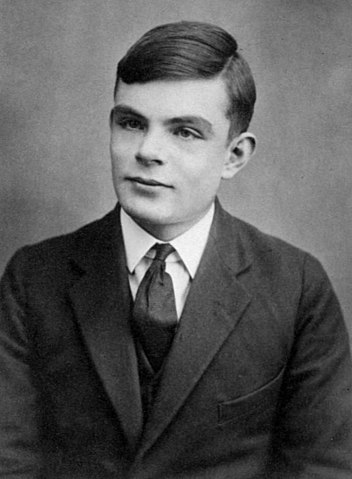
Alan Mathison Turing was born on June 23, 1912, in London, England.
Alan Turing proved he was very intelligent since his childhood but had many problems at school with teachers who gave more importance to classic subjects than to scientific ones.
In 1931, Alan Turing was admitted to King’s College, Cambridge, where he graduated in mathematics and where he studied subjects such as quantum mechanics, logic, and probability. In 1936 he won the Smith Prize, awarded to the best students of physics and mathematics at Cambridge University, before going on to study for two years at Princeton, where he obtained a Ph.D. with a dissertation which introduced some logical and mathematical concepts.
During World War II, Alan Turing worked for British intelligence to decipher the codes used by the Germans. Among his contributions, there were improvements to the Bomba (from the polish bomba kryptologiczna) calculating machine and thanks to his concept not coincidentally called the Turing machine another machine was designed called Colossus, the first to use vacuum tubes.
In 1945, Alan Turing was awarded the Order of the British Empire for services rendered during the war.
After the war, Alan Turing helped to design some of the first computers. In those years, however, strict secrecy still prevailed concerning many activities of that kind and that led to big delays and limits in the ACE (Automatic Computing Engine) project.
In 1948, Alan Turing went to work at the Department of Mathematics at the University of Manchester, where he worked with other primitive computers. Turing addressed the problem of artificial intelligence by devising the Turing test, which can be passed by a machine when an interrogator can’t distinguish it from a human being. Turing also suggested the idea to build an artificial mind that was like a child then have it grow.
In 1952, Alan Turing started working in the field of embryology with a mathematical approach. In particular, he studied the existence of the Fibonacci sequence in plant structures.
In 1952, Alan Turing was accused of homosexuality, which was then a criminal offense in England. He received a suspended sentence but had to undergo chemical castration.
At the time, there were strong fears that gay people could be subject to blackmail by Soviet agents, and Alan Turing was prevented from any further contact with government agencies and was forbidden to talk about the work accomplished during World War II.
On 7 June 1954, Alan Turing poisoned himself with cyanide.
It took many years for all of Alan Turing’s contributions to mathematics and computer science to get recognized publicly. Gradually, however, tributes to Turing started, from the Turing Award, now considered the most important prize in the computer science field, to statues such as the one in Sackville Park in Manchester (photo ©Lmno).

In 2009, a petition was started asking the British government for a posthumous apology to Turing. On 10 September 2009, Prime Minister Gordon Brown publicly recognized the homophobic treatment suffered by Turing and expressed a posthumous apology admitting that he deserved much better treatment.
Today we know the genius of Alan Turing. Who knows how many other contributions Alan Turing could’ve given to modern society if he hadn’t been treated horribly because of the narrow morality of the time.


Permalink
Permalink
Permalink
Permalink
Permalink
Permalink
Permalink
Permalink